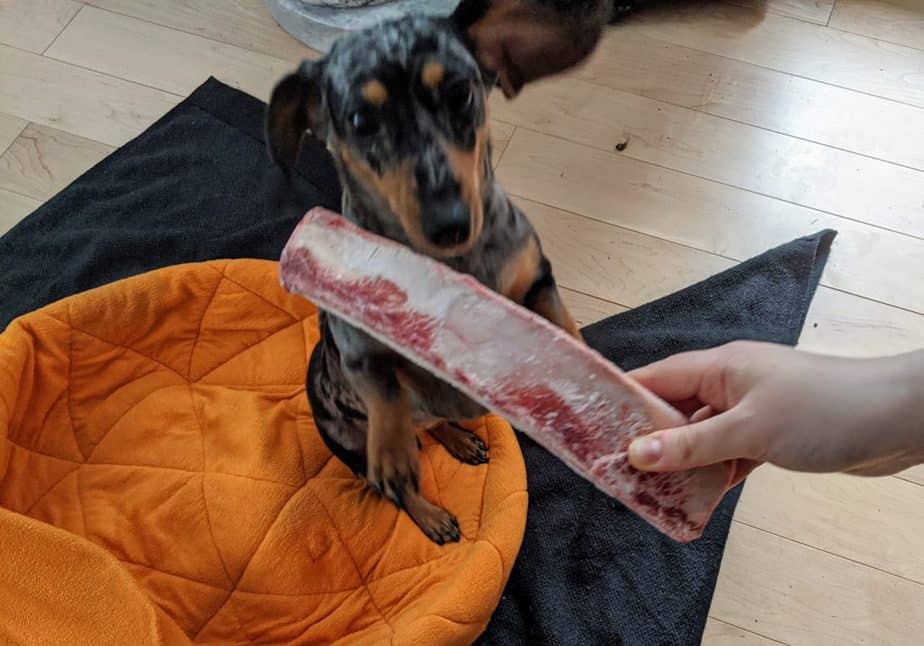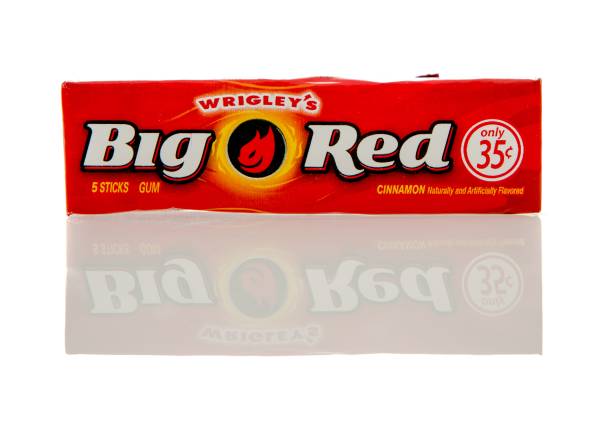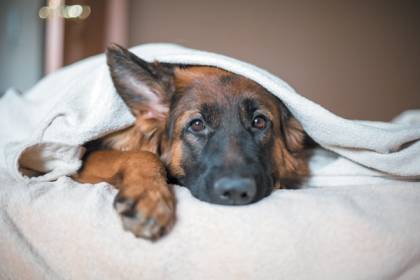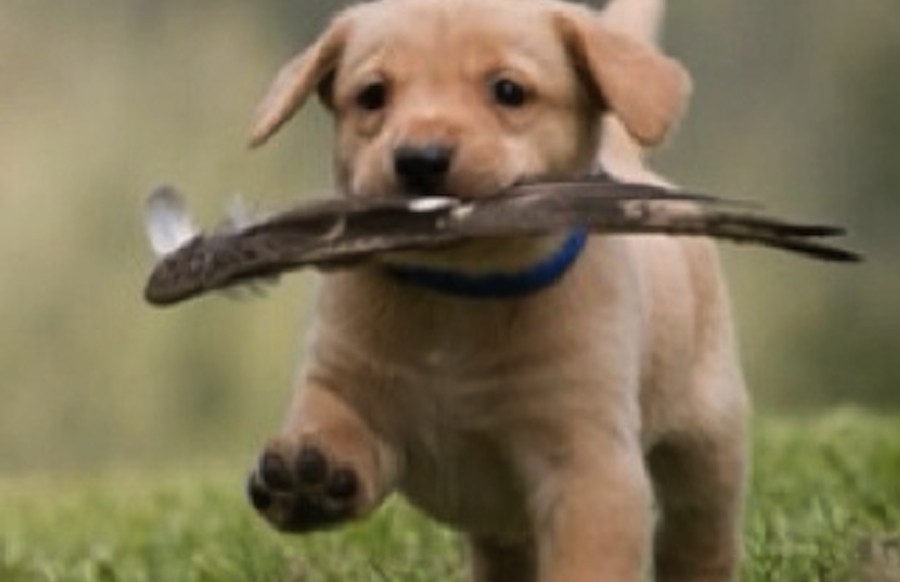Connect with a verified veterinarian in minutes. Licensed vets are available 24/7 to answer your questions. No need to worry about your furry family member.
Dogs love to chew on bones! Does your fur baby have a thing for bones? If so, he’s not alone. If there’s a bone left unattended on a plate, your dog probably has seen it. When you’re not looking, he may make a grab for it! But what happens if your dog eats a pork bone?
Pork Bones Aren’t Safe for Dogs
Can dogs eat pork bones? What if my dog chews on a raw bone?
Pork bones may seem like they would be safe; however, that’s not the case. The reason is that pork bones can easily splinter and crack. It doesn’t matter if they’re raw or cooked. If your dog swallows some very tiny pieces of pork bone (and we mean very tiny), chances are he will be OK.
However, larger pieces of bone can become stuck in your dog’s throat and cause him to choke, or the bones could pass through the digestive system and become stuck, causing an intestinal blockage.
Pieces of pork bone that has sharp edges could also cause small tears and scratches to a dog’s throat. If the pieces pass through to the digestive system, sharp bone pieces could cause tears and damage to the stomach and intestinal tract.
Cooked bones may be safe, but even cooked bones can become lodged in the digestive system and cause damage. Although there are some cases of dogs dying from choking on bones, most dogs will survive. However, the effects of bone fragments causing intestinal blockage are serious and can lead to life-threatening conditions.
Raw pork chop bones can cause intestinal blockage and if ingested by a dog, can cause vomiting, diarrhea, blood in the stool, or shock. If the bone passes through the digestive system and lodges in the intestines, it can cause an intestinal obstruction. If that happens, your dog will need surgery to remove the bone fragments.
If your dog eats a raw bone, it’s best to remove it from his system as soon as possible. If your dog eats cooked bones, you can treat the bone fragments with digestive enzymes and then monitor your dog for any symptoms.
Health Problems Related to Raw Pork Bones
Pork products are a potential choking hazard. These can be very small pieces of bone that pass through the digestive system or larger pieces that become lodged in the throat. They can also be bone splintering. Splinters may get lodged in the esophagus. This can cause an obstruction which is potentially life threatening.
To make matters worse, the sharp edges of these bones can also be dangerous. This is especially true for small dogs who may try to play with them. Raw pork bones can also cause digestive upset in dogs who have certain conditions such as gastric dilatation volvulus (GDV). This is a condition where the stomach wall tears.
Pancreatitis is another potential complication of raw pork bones. This is an inflammation of the pancreas which can cause acute or chronic pancreatitis. The presence of large quantities of pork bones in a dog’s diet can also lead to constipation, diarrhea, vomiting, and blood in the stool.
Even small pieces of raw pork bones are dangerous for dogs, because they can be swallowed, resulting in severe gastrointestinal problems. Raw pork bones are dangerous for dogs because they can cause a blockage in the digestive tract. They can also cause an obstruction of the intestines, which is one of the most common causes of death in dogs. If your dog ingests a piece of raw pork bone, he will probably vomit it up again. The vomiting may lead to dehydration and possibly internal bleeding if your dog has not been properly hydrated. In most cases, your dog will recover from this but he may suffer from pain and discomfort.
A dog’s diet should be supplemented with a quality commercial dog food. The raw pork bones that are commonly used in dog foods are also dangerous for dogs. Raw pork bones contain a toxin called alpha-galactosidase, which is very harmful to dogs.
When you give your dog a bone to chew on, it is important to remember that he will not digest the bone completely. There are certain nutrients in raw pork bones that are toxic to dogs, and they cause the dog to become ill. Feeding pork bones to your dog can be very dangerous, especially if he is not properly hydrated.
If your pooch ingests a piece of raw pork bone, pork rib bones, beef bones, ham bones, chicken bones, or other types of bones, it is important to immediately seek veterinary attention for him.

Review symptoms, medications & behavior to keep your pets healthy with a Vet Online in just minutes.
Ask a Vet Live NowSalmonella and E. coli
If your dog ingests a piece of raw pork bone, he will probably vomit it up again. The vomiting may lead to dehydration and possibly internal bleeding if your dog has not been properly hydrated. In most cases, your dog will recover from this but he may suffer from pain and discomfort.
Many raw meat bones can be contaminated with bacteria. The bacteria may not cause any symptoms in the dog, but it can cause a dangerous condition called salmonellosis. Salmonellosis is a very serious infection of the gastrointestinal tract, which can lead to death if not treated immediately. It is caused by bacteria that are present in raw meat and can be transmitted through contaminated meat.
Trichinella Spiralis
In rare cases, your dog may develop trichinellosis, a disease caused by Trichinella spiralis. This infection can cause death in dogs and is particularly dangerous for large breeds of dogs. The symptoms include muscle tremors, seizures, diarrhea, and vomiting.
Trichinella is transmitted by eating raw meat infected with the parasite. Raw pork can be contaminated with the parasite, which can be found in the muscle of wild pigs and cattle. Your dog may contract trichinellosis from a contaminated raw pork bone if he eats it or if you give him an infected raw pork bone.
Trichinosis
Raw pork bones may also contain parasitic worms that can be transmitted to your dog through contaminated meat. If your dog ingests these parasites, he will probably experience an upset stomach and may vomit up the bone or have diarrhea. If left untreated, your dog may die from this condition. It is important to remember that all meats should be cooked before feeding them to your dog, especially if you live in an area where raw meat is available in stores.
Trichinosis is caused by a roundworm that can be transmitted through the consumption of raw meat. It is a very serious infection and it can cause death if not treated immediately.
Symptoms the Bone is Causing Problems for Your Dog
First, if you know your dog has just swallowed a bone, then watch to see if he begins showing signs of choking. Your canine companion may start to gag, vomit, or even cough. You may notice that he’s pawing his mouth or rubbing his face on the floor or ground. Your fur baby may also be drooling excessively.
However, a bone can become lodged in the esophagus and block your dog’s airways. In this case, you may notice some of the symptoms above, but you may also notice your dog’s skin and mucus membranes are turning blue (this is called cyanosis), which is caused when your dog isn’t getting enough air. This is a medical emergency and your dog needs immediate medical treatment.
If you don’t notice any of the symptoms outlined above, then chances are the bone has gone down without a problem. But there’s possible danger. There’s a chance the bone could cause an intestinal blockage if it passes from the stomach and into the intestines. Symptoms to watch for include:
- Vomiting
- Lethargy
- Weight loss
- Diarrhea
- Loss of appetite
- Abdominal swelling and/or pain
- Constipation
This is a medical emergency which needs to be treated as soon as possible. In most cases, your dog may require surgery to remove the blockage.
Dogs are carnivores, and for a dog to be healthy, the type of meat it eats is important. Dogs need to consume animal proteins from whole foods such as chicken, beef, lamb, and pork. Raw animal protein is an important source of the amino acids that are vital for the dog’s well-being. Protein is an important nutrient for dogs. It is essential for growth and development, and it also plays a vital role in the production of muscle tissue. When a dog consumes an appropriate amount of protein, it is easier for the dog to maintain its body weight and to remain healthy. Protein also has a number of important functions in the body, including: stimulating hair growth; providing energy; supporting immune function; maintaining skin health; and keeping joints healthy.
Dog owners who feed their dogs human foods such as beef, chicken, and turkey are likely to see negative effects on their dogs’ health. These foods contain high levels of calcium and phosphorus. While these are important nutrients for dogs, they can cause problems in the dog’s body. High levels of calcium and phosphorus can lead to a condition known as renal failure. This is a serious health condition that occurs when the kidneys are unable to filter out excess amounts of calcium and phosphorus.
Bone Safety Tips
If you give your dog a bone, always supervise him as they chew on it.
- Be sure to remove all meat off the bone before giving it to your dog.
- Don’t allow your fur baby to bury the bone—they become dry and if chewed again, will splinter.
- Don’t let your dog chew a bone for more than an hour; otherwise, it will dry out and splinter.
- Don’t allow your canine companion to chew through the bone.
- Avoid giving your dog artificial bones, such as rawhide, as these can contain harmful additives.
The Best Bone Alternatives for Dogs
If your dog loves to chew on bones, you may want to give him a safer alternative, including:
Carrots: these are low-fat and contain healthy nutrients for dogs, and they’re safe as long as they are cut to fit your dog’s size and mouth.
Dried chicken or fish: these are crunchy treats that many dogs enjoy—they’re also safer than bones.
Pig ears: give these only as once-in-awhile treats, as they can be too rich for some dogs, and cause digestive upset (such as vomiting and diarrhea).
Antlers: deer and elk antlers are another great alternative for dogs who love to chew bones. They work to keep a dog’s teeth clean, while also providing him with essential nutrients, including potassium, zinc, calcium, and manganese.
Sweet potato chews: are a light, nutritious snack for dogs who love to chew. Sweet potatoes provide your fur baby with lots of fiber and other nutrients to keep him happy and healthy. You can dry the potato slices in the oven. When cooled, serve to your fur baby.
Chew toys: are another great alternative to bones. Chew toys are made super tough for even the most aggressive chewers. The toys can also be used for training, teething, and more. Some, such as the KONG toy, can be filled with peanut butter and other treats to keep your dog active and happy for hours!
We don’t mean to scare you, but bones can be very dangerous for your fur baby. Never leave any type of bones unattended where your dog can reach them or give him pork bones to chew on. Instead, a safer option would be a bully stick, deer antler, or even tough chew toys.
Connect with a verified veterinarian in minutes. Licensed vets are available 24/7 to answer your questions. No need to worry about your furry family member.

Julie
Julie is a graduate of the University of North Carolina, Wilmington, where she studied Animal science. Though contrary to the opinion of her parents she was meant to study pharmacy, but she was in love with animals especially cats. Julie currently works in an animal research institute (NGO) in California and loves spending quality time with her little cat. She has the passion for making research about animals, how they survive, their way of life among others and publishes it. Julie is also happily married with two kids.
Review symptoms, medications & behavior to keep your pets healthy with a Vet Online in just minutes.
Ask a Vet Live Now





